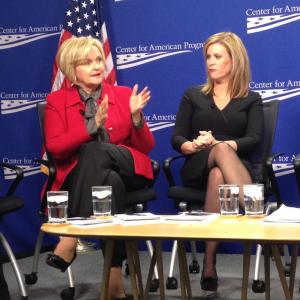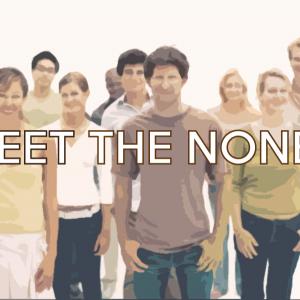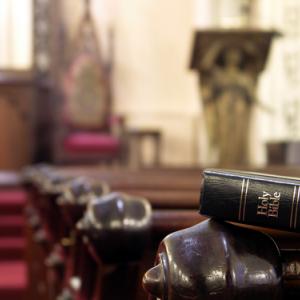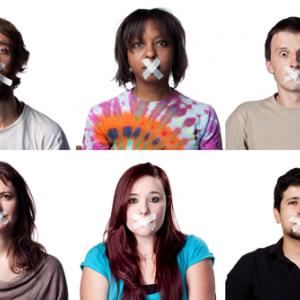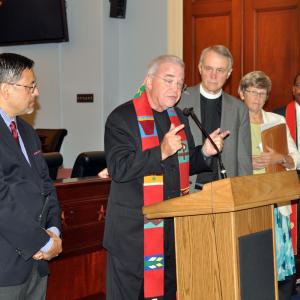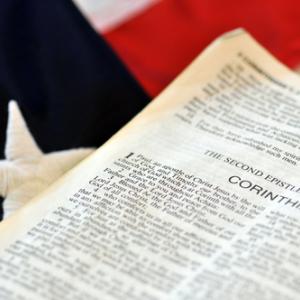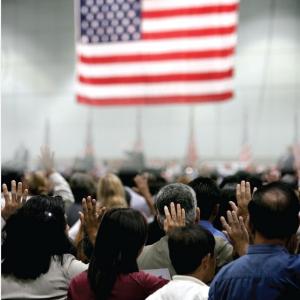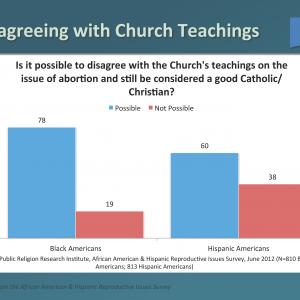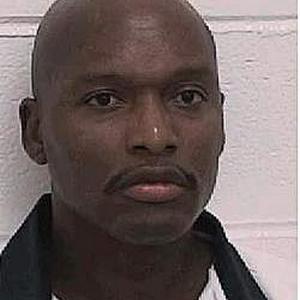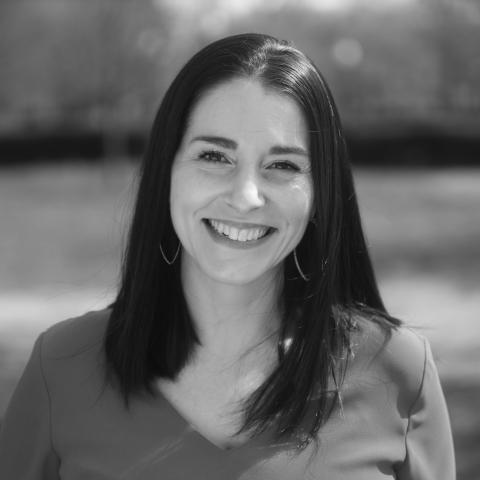
Sandi Villarreal is former editor-in-chief of Sojourners. She came to Sojourners in 2012 after starting her career in print newspaper reporting and veering quickly into digital media and online journalism. Sandi holds a master's degree in journalism from the Medill School of Journalism at Northwestern University and a bachelor's degree in journalism and political science from Baylor University. She has worked in both print and online journalism, publishing, digital marketing, and nonprofit community development.
Sandi is most interested in writing about the intersection of faith, politics, and culture, especially as it relates to women's leadership both within our churches and on the political stage. Sandi has earned awards for her news and commentary writing, as well as for her work as editor of Sojourners' online publication.
Posts By This Author
McCaskill: House 'Should Be Ashamed' on Violence Against Women Act
Everyone in the political sphere, on cable television, and most certainly in Washington, D.C., has only one thing on the mind pre-Christmas, and it isn’t the fat guy in the red suit (and/or Jesus). It’s the fiscal cliff.
And while it’s an incredibly important — and incredibly complex — debate, it’s not the only one worth having right now.
There’s this other thing — this thing that has been happening on a bipartisan basis for eighteen years — that is sitting in the House of Representatives right now while our national confidence in Congress sits at about 6 percent, and our senators are filibustering their own bills. It’s the Violence Against Women Act. This seemingly procedural piece of legislation — which usually is reauthorized without question whenever it comes up — is in danger of expiring if the House doesn’t act before the end of session.
“This should not be controversial. This is something that should be capable of passing on a voice vote,” Sen. Claire McCaskill (D – Mo.) said on Wednesday at a panel discussion on the women’s vote.
'Life of Pi:' A Story to 'Make You Believe in God'
In search of a story that will “make you believe in God?”
It’s a heavy undertaking. Kind of like trying to adapt that story to film, as screenwriter David Magee and director Ang Lee did brilliantly in Life of Pi, which opens nationwide today.
The film, adapted from Yann Martel’s moving book, takes on massive questions — who is God, how do we find God, and why do bad things happen to us — as we follow Pi, a zookeeper’s son shipwrecked on a lifeboat with a Bengal tiger.
“I think we’re humble filmmakers — I don’t think we can answer why bad things happen to people,” Magee told Sojourners Tuesday. “But I do think it puts into perspective the fact that within every ordeal there is a lesson.
“This is very much a story about storytelling,” Magee added. “It’s very much a story about how those different narratives help us get through. It can’t promise to answer why we go through the things we do, but it can say what we take away from them.”
Rock the 'Slut Vote'
Oh, ladies. Just when you thought we were emerging again from the sudden backtrack into 20th-century gender politics, this happened. (Before continuing, I warn: this is the most offensive bit of so-called Christian, “red pill” patriarchy that I have ever read.)
A blog post written on the website of the Christian Men's Defense League — yes, an organization dedicated to protecting the rights of white American Christian men is apparently a thing — blames Mitt Romney's loss Tuesday night on what the author brilliantly coins "the slut vote."
Hat tip to Gawker for finding the cached version of this post, as it was quickly locked down post-publishing. You can view snippets of all of author “BSkillet’s” witticisms HERE.
Most disturbing in this man's tirade against so-called "sluts" — and trust me, there's a lot in there to creep us out — is that he is doing so from a Christian perspective. The banner of the blog cites Psalm 144:1, "Blessed be the LORD, my rock, Who trains my hands for war and my fingers for battle."
The verse of choice is interesting, to say the least. I usually cringe when I hear terms like "war on religion," "war on women," etc., but if anyone is waging it, it's this guy.
There is so much here that completely defies logic, but I thought I'd pull out a couple of gems for our review.
Young Evangelicals, Election 2012, and Common Ground
What culture war? At a survey release of young evangelicals and proceeding panel discussion, common ground was the pervading theme.
While panelists ranged in religious and political backgrounds — representing groups like Young Evangelicals for Climate Action, World Relief, Family Research Council, USAID, World Vision, the Manhattan Declaration, and Feed the Children — there was an overarching agreement that while young evangelicals are largely pro-life, life issues now extend to beyond the typical to things like creation care and immigration.
“There is still a lot of tension that many young people feel in trying to identify with one political party or the other,” Adam Taylor, vice president of advocacy for World Vision. “… There is a real deep commitment to a pro-life agenda, but that agenda has now expanded and includes a core and strong commitment to addressing issues of poverty.”
Meet the Nones: Humbly Christian
Introducing Meet the Nones: We Don't Need Your Labels
Editor's Note: Sojourners has launched this new blog series to help shed light on the nation's latest "religious" affiliation. Scroll down to read their stories. Or EMAIL US to share your own.
Which religious tradition do you most closely identify with?
- Protestant
- Catholic
- Mormon
- Muslim
- Jewish
- Orthodox
- Other Faith
- Unaffiliated
Given these options — or even if you throw in a few more like Buddhist, Hindu, Agnostic — I would choose “Unaffiliated.” That puts me into a category with one-in-five other Americans, and one-in-three millennials, aptly named the “nones.”
In that vein, I introduce our new blog series: Meet the Nones. Through this series, I hope to encourage discussion, debate, and elucidate the full picture of what it means to be losing your religion in America.
Editor's Note: Would you like to share your story on this topic? Email us HERE.
Study: 20 Percent of U.S. Adults Have No Religious Affiliation
One-in-five adults in the United States — and a third of adults under 30 — say they have no religious affiliation. The numbers are out in a new report called “’Nones’ on the Rise,” put out by the Pew Forum on Religion and Public Life. That 20 percent of the population is up from 15 percent just five years ago.
But while our church membership rolls may be shrinking, “unaffiliated doesn’t necessarily mean wholly secular,” said senior researcher Cary Funk at the Religion Newswriters Association Conference in Bethesda, Md., on Saturday.
In fact, two-thirds of the 46 million Americans self-identifying as having no religion also say they believe in God. And 21 percent of them say they pray every day. A large portion of this group — 37 percent — say they consider themselves “spiritual but not religious.”
The increase in disaffiliation goes hand-in-hand with an overall lack of trust in American institutions across the board, from the government to the news media, and now, to our houses of worship.
The “nones” overwhelmingly say religious institutions are too concerned with money and power, and 67 percent say they both focus too much on rules and are too involved in politics.
The Disillusionment of Our Youngest Voters
Young millennials — age 18 to 25 — are more comfortable with an evangelical than Mormon (or atheist or Muslim) president. This, according to part two of the Millennial Values Survey put out by the Public Religion Research Institute and Georgetown University’s Berkley Center.
Nearly six in 10 of those surveyed say they would be comfortable with an evangelical Christian serving as president, while 44 percent would be comfortable with a Mormon.
The numbers line up with those supporting President Barack Obama over Gov. Mitt Romeny at 55 percent to 39 percent — a spread that has actually increased 16 points since March.
But that won’t necessarily convert into votes. Nearly two-thirds of those surveyed are registered to vote, but only half report they are absolutely certain they will cast a vote in November.
The candidates’ religion isn’t the only factor affecting young peoples’ voting patterns. Another issue is a lack of voter engagement in the political process altogether.
“Millennials have a reputation for being the ‘wired’ generation, but when it comes to government, they’re unplugged,” said Daniel Cox, PRRI research director, in the news release Friday. “Across a range of measures, younger millennials indicated that they are disillusioned with the government’s ability to respond to their needs.”
VIDEO: Obama, Romney Answer Faith Leaders' Call to Address Poverty in Election
Christian leaders asked, and the presidential nominees answered. The poverty rate in America is still at a staggering 15 percent and 46.2 million Americans remain in poverty — what is your plan to address the problem?
The Circle of Protection, composed of Christian leaders from across the religious spectrum, released President Barack Obama's and GOP nominee Mitt Romney's video responses today at the National Press Club in Washington, D.C.
(VIDEOS from Obama and Romney after the jump.)
She Said — Egalitarianism: Men, Submit to Your Wives
Editor's note: This is a He Said, She Said on the issue. To read this author's husband's take, go HERE.
Who would have thought that five years into our marriage we would still be having this debate? Gender roles. Egalitarianism. Complementarianism.
If you've come here first, please read my husband's take on the issue before continuing on.
We tend to think fairly similarly, though he likes to think himself a complementarian, while I tend toward the egalitarian label. I love words, but that's all these are: words. I think it's all in how you define it for yourself. But since he brought it up …
I Need a Hero ... ?
The scandal du jour across the morning news shows today was Lance Armstrong's decision to stop fighting doping investigations. It means he is stripped of his record seven victories in the Tour de France and his bronze medal in the 2000 Olympics.
While saying uncle in the doping fight doesn't necessarily equal guilt, the presumption is that Armstrong knew things were going to come out in the investigation — that there was some evidence or testimony that would not look good.
Today on Morning Joe, I thought MSNBC contributor Jonathan Capehart hit the nail on the head:
"This is yet another institution that has failed. … We've seen everything that people believed in — whether it's the financial institution or government itself or just heroes — just falling by the wayside. You're seeing that this world that we have constructed of sort of purity and perfection, it's just not real."
Ad Campaign Calls on Christians to 'Love Your Neighbors' of All Faiths
In early August, a mosque in Joplin, Mo., burned to the ground. It was the second fire that damaged the facility this summer — the first, determined to be arson. In light of this attack and others like it across the country — including the heinous shooting at a Sikh gurudwara outside of Milwaukee that killed six worshippers — Sojourners called on our community to help us get the word out that we are called to love our neighbors. All of them.
The response was overwhelming. As a result of generous contributions, Sojourners not only took out an ad in The Joplin Globe, but also erected billboards with the same message, both in Joplin and in Oak Creek, Wis., three blocks from the Sikh gurudwara.
The message is simple. "Love your Muslim neighbors." "Love your Sikh neighbors."
It's not radical in language, but it is a radical love that Jesus extends to us and asks us to show others.
In Defense of the Om
I grew up thinking a lot of things were evil: cursing, smoking, Texas A&M, Democrats.
But one thing that never fell into the “damned” category was yoga. I guess it just didn't come up. So I was more than a little confused when a few years ago, pastors across the religiously affiliated spectrum started condemning my workout class of choice.
Seattle megachurch pastor Mark Driscoll has said multiple times yoga is evil, concluding, “A faithful Christian can no more say they are practicing yoga for Jesus than they can say they are committing adultery for Jesus.” Southern Baptist Theological Seminary president Albert Mohler said — and was later lambasted for it — that embrace of yoga is contradictory to Christian commitment. Even the guy at the Vatican who does exorcisms said yoga is the “work of the devil.”
To which my initial response — to quote the Dude — is … well, y’know, that’s just, like your opinion, man. (Er, I mean men. White pastorly men.)
Faith Leaders Tell Congress to 'Get a Conscience'
Faith leaders on Wednesday gathered on Capitol Hill to release a letter calling on Congress to extend the Earned Income Tax Credit (EITC) and Child Tax Credit (CTC) — programs aimed at keeping the poor and most vulnerable in our country out of poverty. The call comes in advance of a U.S. House of Representatives vote to extend the Bush-era tax cuts.
In 2010, the EITC and CTC lifted about 9 million people out of poverty, including 4.9 million children, according to the Center on Budget and Policy Priorities.
"The Bible confronts every Evangelical lawmaker with more than 2,000 verses, which call us to defend the poor and vulnerable. If we say we believe the Bible, we simply can’t support policies that directly reward the rich and punish the poor: Christian lawmakers can’t keep going into their prayer breakfasts and leaving their Bibles at the door," said Jim Wallis, president and CEO of Sojourners (Wallis' full statement can be read HERE).
What Religious Freedom Is — And Is Not
Right now, it’s difficult to voice a call for civility surrounding religious debates without backlash that you’re stomping on rights or stifling someone’s voice. But here’s hoping.
Religious freedom. What does it mean, and what were we promised? In Sunday’s New York Times, Ross Douthat — columnist and author of Bad Religion: How We Became a Nation of Heretics — points out that we have a guaranteed right not only to religious belief, but to religious exercise. That right to religious exercise, he argues, is violated in cases like the HHS mandate and the Chick-fil-A debacle.
From Douthat’s piece:
“If you want to fine Catholic hospitals for following Catholic teaching, or prevent Jewish parents from circumcising their sons, or ban Chick-fil-A in Boston, then don’t tell religious people that you respect our freedoms. Say what you really think: that the exercise of our religion threatens all that’s good and decent, and that you’re going to use the levers of power to bend us to your will.”
From here, people tend to go to extremes. On one side: boycott everything whose owner you have a philosophical or religious disagreement with on a personal level. But really do it. Sure it’s easy enough to shun fast food, but enough research will likely prove that our American dream to be comfortable far outweighs our attention span. (Please excuse my cynicism, and please let me know if any of you are successful in this endeavor. I’ll tip my hat to you.)
Of course, it cuts both ways. Extremism comes in a variety of political preferences, so I’ll throw this out there as well: No, there is not a “war on religion” in the United States.
'Homeland' Asks Tough Questions About Immigration Policy
Can America still afford to be a generous immigrant nation? Can it afford not to be?
These are the questions posed by Nine Network of Public Media's and PBS's documentary Homeland: Immigration in America. The first of a three-part series focused on job issues.
While the largest Hispanic populations are in California and Texas, the fastest growing Hispanic populations are in smaller Southern and Midwestern towns.
The episode shined a spotlight on Monett, Mo., home to a Tyson Foods chicken processing plant; EFCO, a Pella Company; and Happy Apples — an apple orchard that produces caramel apples for nationwide sales. The plants have relied on immigrant labor for years, and now the city has revitalized because of the influx of Hispanic immigrants.
While the issue of illegal immigration is at the forefront of people's minds when discussing immigration reform as a whole, the documentary points out the flaws in the legal immigration process as it exists.
Pro-Life or Pro-Choice? Many Are Saying Both
The influence of clergy in swaying their congregants' attitudes about moral issues like abortion and contraception access is dwindling, according to a new study.
The Religion, Values, and Experiences: Black and Hispanic American Attitudes on Abortion and Reproductive Issues survey, conducted by the Public Religion Research Institute, shows that there continues to be a disconnect in personal, moral belief and feelings about public policy.
"What they're hearing at church is not the big mover on attitudes of legality of abortion," Robert Jones, PRRI CEO, said.
While 51 percent of black Americans believe abortion is morally wrong, 67 percent say it should be legal in all or most cases.
"I really think that freedom of choice is probably one of the most precious components of what it means to be a Christian. Blacks have been quite possessive and reflective of this fact," said Dr. Stacy Floyd-Thomas, associate professor of Ethics and Society at Vanderbilt University's Divinity School. "… You do have the majority saying that they might see it as a sin or they are against it, but you still have the right."
Both groups believe it is possible to disagree with church teaching and be a good Catholic or good Christian. Jones pointed to the growing trend of personal versus external focus. Previous surveys have shown that attitudes about religion are mostly influenced by people's own beliefs and behaviors rather than institutional doctrine.
Survey: Black, Hispanic Americans Say Economy Critical Issue in Election
A new poll released today shows an overwhelming percentage of black and Hispanic voters favor Barack Obama over Mitt Romney in the upcoming presidential election — 87 percent and 58 percent, respectively. Both groups say the economy is a critical issue in the election.
The Religion, Values, and Experiences: Black and Hispanic American Attitudes on Abortion and Reproductive Issues survey, conducted by the Public Religion Research Institute, also showed that two-thirds of black Americans believe abortion should be legal in all or most cases, while only 46 percent of Hispanic Americans agreed.
Both black and Hispanic Americans (81 and 79 percent, respectively), say contraception is morally acceptable and support expanding access to it. Further 61 percent of black Americans and 64 percent of Hispanic Americans say religiously affiliated institutions should provide contraception at no cost to their employees.
For more on the survey, stay tuned to the God's Politics blog for continued coverage.
Cruel and Unusual: Georgia Set to Execute Mentally Disabled Man
Despite protests not only from jurors who conivicted him but also from his victim’s family, Warren Hill, a 52-year-old mentally disabled man convicted of murder, is scheduled to be executed by lethal injection on July 23 in Jackson, Ga.
In 1991, a jury found Hill guilty in the bludgeoning to death a fellow inmate, Joseph Handspike, and sentenced him to death. Hill had been serving a life sentence for the 1986 killing of his girlfriend at the time of Handspike's death.
Hill has an I.Q. of about 70, leading a state judge to find him "mentally retarded" by a “preponderance of the evidence.”
While Georgia — as the rest of the United States — has banned the execution of mentally retarded inmates, the state has a stricter standard that requires proving mental retardation “beyond a reasonable doubt.” By that standard, the Georgia Supreme Court overruled the judge's finding of mental retardation, reversed the decision, and reinstated Hill’s death sentence, which originally had been set for today.
What the Numbers Say About Losing Our Religion
Among the list of U.S. institutions—banks, the medical system, the U.S. Supreme Court, Congress—where would you pin organized religion?
According to a recent Gallup poll, it comes in fourth, falling behind the military, small business, and police. Only 44 percent of Americans have a "great deal" or "quite a lot" of confidence in the church—a downward fall that has been the trend since its height in the 1970s.
Drilling down, Protestants tend to have higher confidence—56 percent—in their churches than Catholics, who fall in at 46 percent. (Commentary is linking this to the child abuse scandals.)
Organized religion isn't alone in this. The overall lack of confidence in American institutions is evident across the board, with television news at 21 percent and Congress at an abysmal 13 percent. Even public schools come in at 29 percent.
But is this at all surprising?
